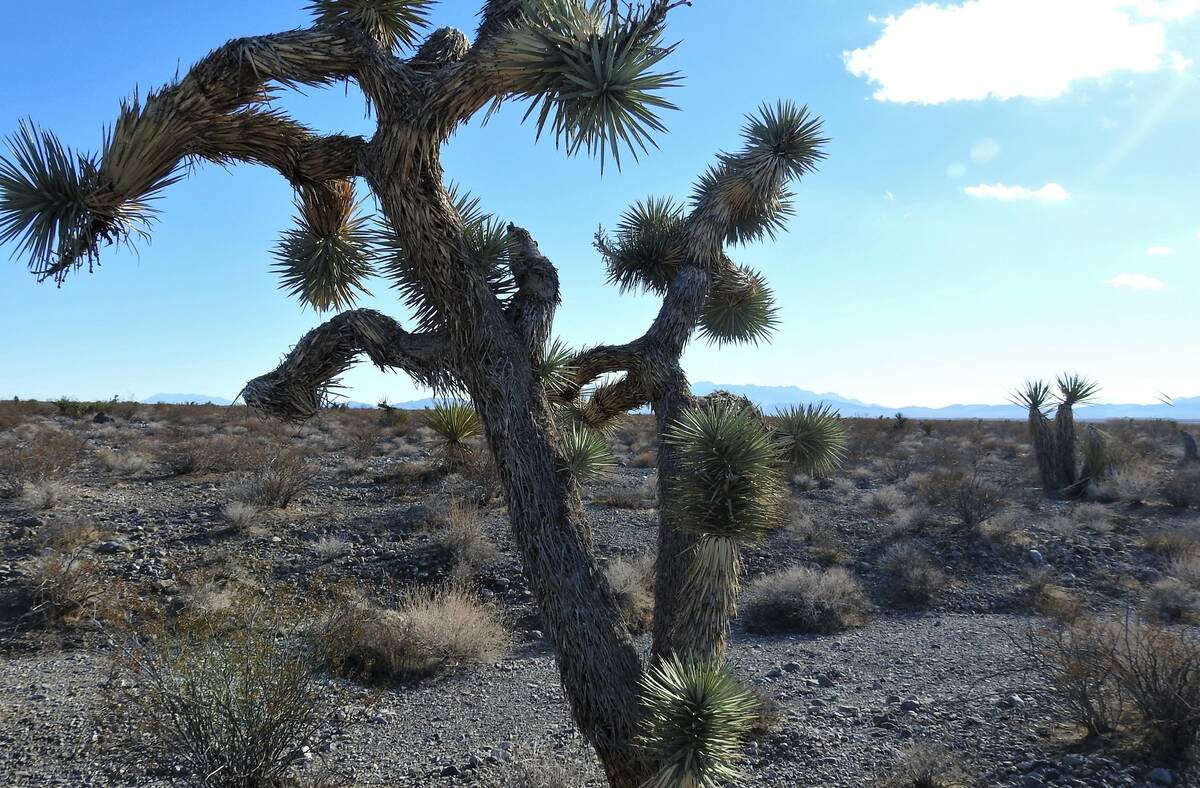Solar project on Nye County border moves closer to construction
A hotly contested solar project that straddles the Nye-Clark County line received its final federal permits on Thursday to proceed with construction.
The Bureau of Land Management’s record of decision signals that California-based solar company Candela Renewables may proceed with construction scheduled to begin later this year, said Jim Woodruff, senior vice president of public affairs.
Known as the Rough Hat Clark County Solar Project, it will occupy a triangular space of about 2,430 acres of public land on the border of Nye and Clark counties along Highway 160.
“BLM’s thorough review of all aspects of this project under (the National Environmental Policy Act) ensures that the project will adhere to the highest environmental stewardship standards, preserving desert habitat with minimal ground disturbance during construction,” Woodruff said in a statement. “We look forward to moving forward with this project that will not only provide renewable energy but also create jobs and tax revenue for the area.”
The environmental review was one met with concern from community members and environmentalists, some of whom wrote a letter in March to urge federal officials to cancel the process because of impacts to the desert tortoise, listed as threatened under the federal Endangered Species Act.
Concern for tortoise
Estimates show there are 114 tortoises in the area. In Nevada, the species is commonly kept as pets. Tortoises that are native to the region, where there are several solar projects in the works, will be relocated to Stump Springs, a nearby site deemed an appropriate habitat.
In a biological opinion, the U.S. Fish and Wildlife Service determined that the project wouldn’t affect the tortoise population as a whole, save a few potential injuries or deaths.
Through the review process, an alternative plan that may have allowed tortoises to re-enter the solar facility was ruled out because of a lack of intact habitat and because they “do not coexist well with human development and disturbances.”
The chosen plan requires the company to maintain 60 percent of vegetation and 10-inch-by-12-inch wildlife access holes.
“They’ve moved away from this idea that the tortoises and the solar panels can live happily together and sing Kumbaya,” said Kevin Emmerich, co-founder of Basin and Range Watch, one of the nonprofits fighting mass solar development in the Mojave Desert.
Solar a controversial issue in Nye County
In Nevada’s hydrological basin with the highest number of individuals who rely on domestic wells for their drinking water, some have ruled out solar construction as a productive use of water.
Candela Renewables previously told the Las Vegas Review-Journal that it would use almost all of its 800 acre-feet, or less than 261 million gallons, of water rights for construction. With multiple projects working their way through the federal permitting phase, that strain on the basin can add up, Emmerich said.
“We’re really worried that all of these projects are going to cumulatively take up about maybe 5,000 to 6,000 acre-feet just for their construction phase,” Emmerich said.
A handful of representatives filed protests to the final environmental impact statement, which were resolved in January. Among the organizations that submitted protest comments were Nye County, the Sierra Club, the Center for Biological Diversity and the Desert Tortoise Council. All were denied or dismissed.
“Nye County argues that the proposed project is not a harmonious management of the various resources available to this specific plot of land,” wrote Megan Labadie, Nye County’s natural resources director.
Contact Alan Halaly at ahalaly@reviewjournal.com. Follow @AlanHalaly on X.
















